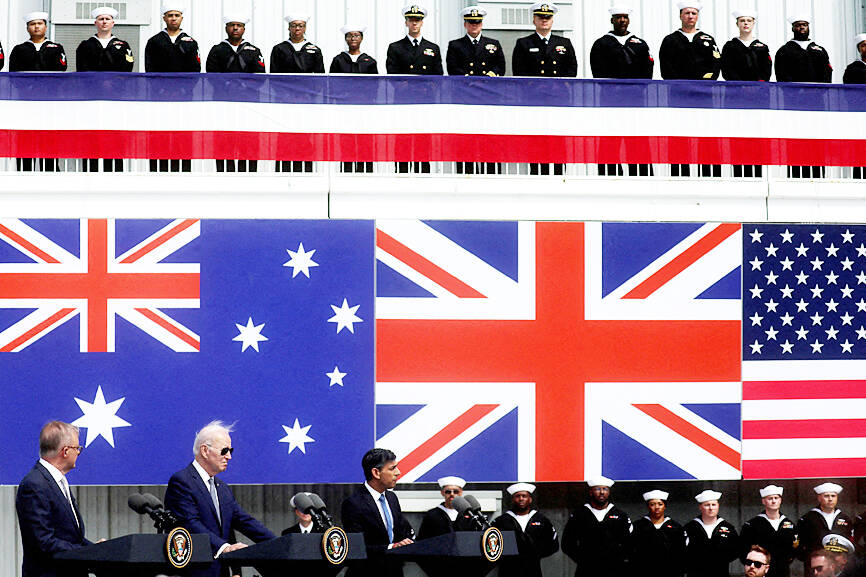Australia yesterday downplayed reports Japan could soon join its AUKUS security pact with the UK and the US, saying that any cooperation would be on a project-by-project basis as differences have emerged within the pact over adding new members.
Australian Prime Minister Anthony Albanese praised Japan as a close partner, but said there were no plans to add a fourth member to the pact at a news conference called hours after the AUKUS defense ministers announced they would consider working with Japan on military technology projects.
“What is proposed is to look at ‘pillar two’ of AUKUS and look at a project-by-project, whether there would be engagement, and Japan is a natural candidate for that to occur,” Albanese said. “What is not proposed is to expand the membership of AUKUS.”

Photo: Reuters
Australian Minister for Defence Richard Marles reiterated the AUKUS partners could potentially work with Japan on specific technology projects, but the nation would not join the pact.
AUKUS, formed in 2021, is part of efforts to push back against China’s growing power in the Indo-Pacific region.
The first stage, or “pillar,” aims to deliver nuclear-powered attack submarines to Australia. The second pillar is focused on sharing military technology and cooperation in areas including quantum computing, artificial intelligence and cybertechnology.
While the US has previously raised the possibility of involving other nations, including Japan and New Zealand, expanding the pact faces hurdles from strict US restrictions on sharing technology and hesitation in other capitals.
Canberra worries adding a fourth nation to the alliance would complicate and take attention away from the already difficult task of acquiring nuclear-powered submarines, a diplomatic source said.
A Japanese government official on Monday said that discussions about formally joining the alliance would likely not be welcomed by Australia or the UK until they had concrete results from the pact.
“Talking about increasing the number of members when nothing’s been achieved with AUKUS yet would only disrupt the framework of cooperation that is meant to be its basis,” said the official, who spoke on condition of anonymity.
Even in the absence of political obstacles, officials and experts say Japan needs to introduce better cyberdefenses and stricter rules for guarding secrets before it can be incorporated in the pact.
A summit in Washington between US President Joe Biden and Japanese Prime Minister Fumio Kishida today is expected to address Japan’s possible future involvement in pillar two projects.
China has criticized the pact and said it could spark a regional arms race.
A Chinese Ministry of Foreign Affairs spokesperson on Monday said that expanding AUKUS would destabilize the region and Japan should act cautiously on defense issues given its history.
US Deputy Secretary of State Kurt Campbell, a key architect of US’ Indo-Pacific policy and a proponent of wider involvement in pillar two of AUKUS, last week said that the US was encouraging Japan to do more to protect intellectual property and hold officials accountable for secrets.
“It’s fair to say that Japan has taken some of those steps, but not all of them,” Campbell said.

A car bomb killed a senior Russian general in southern Moscow yesterday morning, the latest high-profile army figure to be blown up in a blast that came just hours after Russian and Ukrainian delegates held separate talks in Miami on a plan to end the war. Kyiv has not commented on the incident, but Russian investigators said they were probing whether the blast was “linked” to “Ukrainian special forces.” The attack was similar to other assassinations of generals and pro-war figures that have either been claimed, or are widely believed to have been orchestrated, by Ukraine. Russian Lieutenant General Fanil Sarvarov, 56, head

SAFETY FIRST: Double the number of police were deployed at the Taipei Marathon, while other cities released plans to bolster public event safety Authorities across Taiwan have stepped up security measures ahead of Christmas and New Year events, following a knife and smoke bomb attack in Taipei on Friday that left four people dead and 11 injured. In a bid to prevent potential copycat incidents, police deployments have been expanded for large gatherings, transport hubs, and other crowded public spaces, according to official statements from police and city authorities. Taipei Mayor Chiang Wan-an (蔣萬安) said the city has “comprehensively raised security readiness” in crowded areas, increased police deployments with armed officers, and intensified patrols during weekends and nighttime hours. For large-scale events, security checkpoints and explosives

PUBLIC SAFETY: The premier said that security would be tightened in transport hubs, while President Lai commended the public for their bravery The government is to deploy more police, including rapid response units, in crowded public areas to ensure a swift response to any threats, President William Lai (賴清德) said yesterday after a knife attack killed three people and injured 11 in Taipei the previous day. Lai made the remarks following a briefing by the National Police Agency on the progress of the investigation, saying that the attack underscored the importance of cooperation in public security between the central and local governments. The attack unfolded in the early evening on Friday around Taipei Main Station’s M7 exit and later near the Taipei MRT’s Zhongshan

REBUFFED: In response to Chinese criticism over recent arms sales, Washington urged Beijing to engage in meaningful dialogue instead of threats and intimidation Washington’s long-term commitment to Taiwan would not change, the US Department of State said yesterday, urging Beijing to stop pressuring Taiwan and engage in meaningful bilateral dialogues. The remarks came in response to a backlash from Beijing about Washington’s latest approval of arms sales to Taiwan. The US Defense Security Cooperation Agency said in a statement on Wednesday that the Taipei Economic and Cultural Representative Office in the US has asked to purchase an arms package, including Tactical Mission Network Software; AH-1W helicopter spare and repair parts; M109A7 self-propelled howitzers; HIMARS long range precision strike systems; tube-launched, optically tracked, wire-guided missiles; Javelin